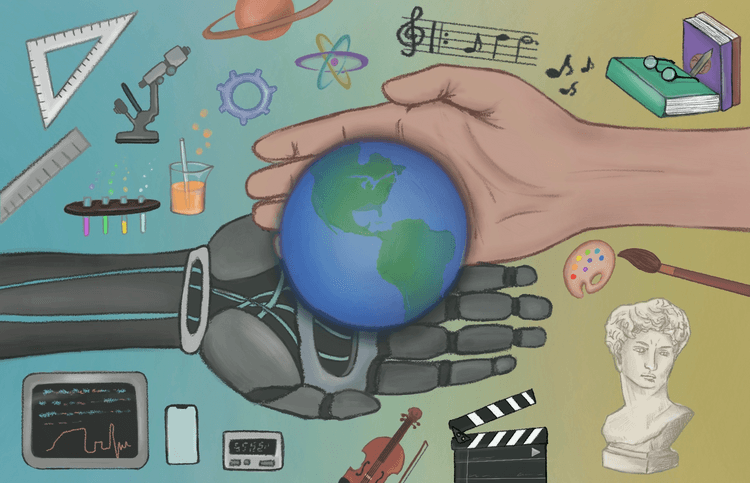Beneath enrollment trends lies point of intersection for STEM, humanities
May 03, 2022

Yoonseo Lee | File
Historically, the humanities have been considered to be entirely divorced from STEM. Students and faculty alike believe the two classes of subjects have different skill sets, methodologies and guiding principles.
But some question if the two are truly discrete; is there room for overlap despite their apparently contrasting natures?
Diving into the data
Although both STEM and humanities degrees from UC Berkeley are held in high regard, campus enrollment data tell a slightly different story. According to campus's Our Berkeley dashboard, the 10 largest majors over the past decade have been heavily skewed toward STEM subjects.
The 10 largest major programs over time
STEM major programs are indicated by a blue line while humanities programs are indicated by a yellow line.
During the 2012-13 academic year, four of the top 10 most popular majors on campus fell under the humanities. Political science, for example, ranked as the second most popular major with 937 declared students. At the same time, campus's fledgling computer science program in the College of Letters and Sciences had only 318 declared majors.
Nine years later, the number of declared political science majors has remained roughly the same. Enrollment in the computer science program skyrocketed, however, with more than 2,000 students declaring the major.
Similar trends can be seen in other humanities and STEM majors, despite an overall increase in admitted students.
Over the same nine-year period, the overall number of English, rhetoric, anthropology and history majors fell by more than 40% while the data science major went from being nonexistent in the 2017-18 academic year to garnering more than 1,000 students.
'Indispensable lenses': Faculty discuss importance of humanities
While the numbers tell one story, campus lecturers and professors offer a different perspective on the roles of STEM and the humanities.
For Hannah Zeavin, a lecturer in campus's English and history departments, the humanities may be key to informing decisions made in traditionally STEM fields.
“Humanities and social science programs offer indispensable lenses for students working in STEM,” Zeavin said. “The challenges facing scientists — including health disparities and UX design — can be united by how they would be better addressed by taking the humanities more seriously.”
While there are issues of decreasing enrollment in some humanities majors, Zeavin said there is growing interest in working in fields that unite different disciplines in “productive intersections.”
Cathryn Carson, professor and chair of campus's history department, added there was a “groundswell of interest” that prompted the creation of one such intersection: the science, technology and society minor.
The minor, which falls under campus's Center for Science, Technology, Medicine and Society, aims to provide “critical apertures” to contemporary issues ranging from systemic racism in health care to ethical issues in biotechnology, according to Zeavin.
Zeavin noted science and technology studies can bring together students from various disciplines to “detangle” complex socioethical systems and prompt productive debates.
“Berkeley has been a leader in the world on thinking through these problems, and there are many spaces for undergraduates to get involved,” Zeavin said. “Seeing engineering students and data science students together, they will complement each other strongly. It's not an 'either-or' situation.”
'Shaped by STEM': Avoiding the identity crisis
Carson echoed Zeavin's sentiments on what the future of STEM and the humanities may look like. Instead of viewing the two as completely separate disciplines, Carson said they “mutually shape each other.”
Using data science as an example, Carson said the discipline needs the perspectives and approaches of the humanities to consider its impacts on people. According to Carson, each aspect of STEM has some implication for human beings that require a more critical lens to address responsibly.
“Data science considers how human beings find themselves reflected or shaped in the data,” Carson said. “To examine structures in race and class, we have to consult the humanities.”
Carson added the humanities bring a wealth of experience and potential answers to “questions of humanity and existence.”
In other words, according to Carson, human beings are both “shaped by STEM and shape STEM.” Beyond classes, Carson pointed to an increased emphasis on ethics in STEM disciplines and highlighted a recent ASUC resolution that called for more ethics courses in these majors.
“There is no STEM without human beings,” Carson said.
Although Carson discussed how STEM and the humanities are intertwined, she emphasized the power methods from the humanities independent of other disciplines.
Assistant professor of practice in the School of Information Daniel Aranki agreed, noting the importance of preserving each discipline’s “core identity,” while still benefiting from techniques from different fields.
“Just as the study of ethics is proving fundamental for engineers and data scientists, some STEM methods can benefit humanities and social sciences,” Aranki said in an email. “The idea is not for everyone to be an expert in STEM methods, but rather to expand their skill set to include some tools that could help them in their own study.”
Aditya Katewa is a student government reporter. Contact him at akatewa@dailycal.org.
Veronica Roseborough is the deputy projects editor. Contact her at vroseborough@dailycal.org.
About this story
This project was developed by the Projects Department at The Daily Californian.
Data for this project come from UC Berkeley's Our Berkeley data dashboards.
Questions, comments or corrections? Email projects@dailycal.org.
Code, data and text are open-source on GitHub.
Support us
We are a nonprofit, student-run newsroom. Please consider donating to support our coverage.
Copyright © 2025 The Daily Californian, The Independent Berkeley Student Publishing Co., Inc.